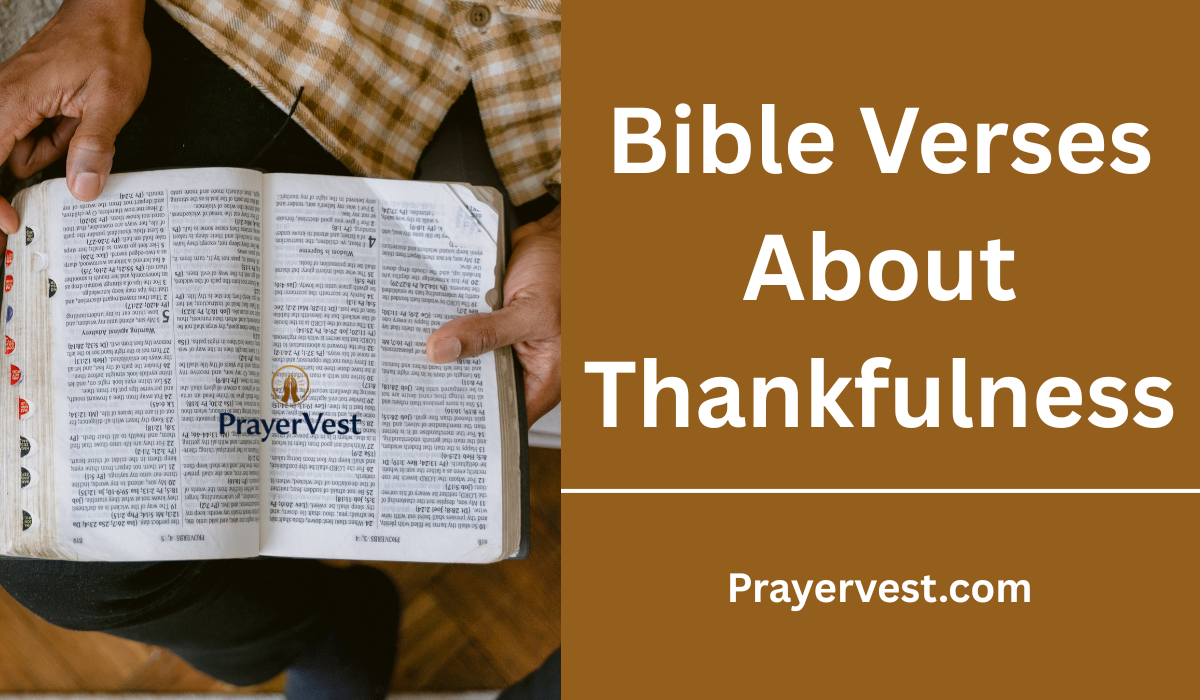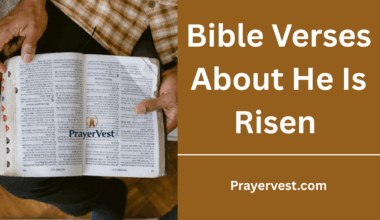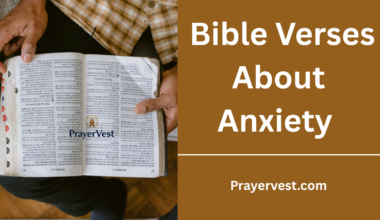The Bible frequently discusses thankfulness, serving as a reminder of its significance in our interactions with God and other people. According to scripture, being thankful is an attitude of the heart that recognizes God’s love, faithfulness, and provision rather to just being a courteous gesture.
The Bible encourages us to express gratitude in both happy and difficult times, not because things are always simple but rather because God is ever-present, all-powerful, and deserving of our gratitude. Our perspective is changed by gratitude, which enables us to concentrate on the innumerable blessings we have rather than our shortcomings.
From the New Testament letters of Paul to the Old Testament hymns of praise, gratitude is demonstrated as a crucial manifestation of faith and trust. Paul persuaded the early church to develop hearts of thankfulness in every situation, and the psalmists sang songs of praise for God’s deliverance, mercy, and unwavering love.
These verses serve as a reminder that having thankfulness is essential to living a happy, fulfilled, and spiritually fulfilling life. It makes us closer to God, increases our delight, and fortifies our faith.


Examining thankfulness-related Bible scriptures enables us to understand how thankfulness influences our spiritual journey. It teaches us to enjoy God’s bounties every day and to stay rooted in His goodness even in the face of hardship. By reflecting on these verses, we develop an attitude of gratitude that transforms ordinary situations into occasions for worship. Being thankful helps us develop serenity, humility, and a heart that is in line with God’s will. It is also a potent remedy for anxiety, fear, and dissatisfaction.
40 Inspiring Bible Verses About Thankfulness (2026)
1. Psalm 100:4
“Enter his gates with thanksgiving and his courts with praise; give thanks to him and praise his name.”
This verse paints a vivid picture of how we should approach God—with hearts overflowing in gratitude. Thanksgiving is not just an act but an attitude that ushers us into His presence. By entering with thankfulness, we acknowledge God’s goodness, provision, and sovereignty. It reminds us that gratitude transforms our perspective, opening our hearts to worship and aligning our spirit with His divine presence.
2. 1 Thessalonians 5:18
“Give thanks in all circumstances; for this is God’s will for you in Christ Jesus.”
Paul’s instruction to the church is clear: gratitude is not conditional. We are called to give thanks in every circumstance, whether joyful or challenging, because thanksgiving is central to God’s will for us. This verse teaches that gratitude is a discipline of faith, helping us trust God’s purpose even when we don’t fully understand our situation. It shifts our focus from problems to the One who works all things for our good.
3. Colossians 3:15
“Let the peace of Christ rule in your hearts, since as members of one body you were called to peace. And be thankful.”
Here, Paul links peace and gratitude, showing us that thankfulness flows from a heart anchored in Christ’s peace. When God’s peace governs our hearts, we are freed from anxiety and complaint, enabling us to live with gratitude toward Him and harmony with others. Thankfulness, therefore, is not just an individual practice but also a communal witness of unity within the body of Christ.
4. Philippians 4:6
“Do not be anxious about anything, but in every situation, by prayer and petition, with thanksgiving, present your requests to God.”
This verse offers a powerful remedy to worry: prayer infused with thanksgiving. Gratitude is not something we add at the end of our prayers, but the spirit in which we bring them before God. It acknowledges His past faithfulness and affirms our trust in His present provision. By combining prayer with thanksgiving, we shift from fear to faith, from anxiety to assurance in God’s care.
5. Psalm 106:1
“Praise the Lord. Give thanks to the Lord, for he is good; his love endures forever.”
This verse beautifully ties thanksgiving to God’s unchanging nature. Gratitude is not dependent on our temporary situations but on His eternal goodness and steadfast love. By giving thanks, we acknowledge His faithfulness throughout all generations. It reminds us that even in times of uncertainty, God’s enduring love is reason enough to lift our hearts in thanksgiving and praise.
6. Ephesians 5:20
“Always giving thanks to God the Father for everything, in the name of our Lord Jesus Christ.”
Paul calls believers to live in a posture of constant gratitude, not just in good times but for everything. This verse challenges us to see God’s hand in all circumstances, recognizing His sovereignty and care. True thankfulness is not selective; it embraces both blessings and trials as opportunities for growth and deeper trust in God. Gratitude, then, becomes a lifestyle rooted in the name and authority of Jesus Christ.
7. Psalm 95:2
“Let us come before him with thanksgiving and extol him with music and song.”
This verse emphasizes communal thanksgiving as an act of worship. Gratitude expressed in song and praise unites believers and glorifies God in a joyful celebration of His greatness. Coming before Him with thanksgiving reminds us that worship is not just about receiving but about offering our hearts in acknowledgment of His goodness. It invites us to replace complaints with songs of praise.
8. Colossians 4:2
“Devote yourselves to prayer, being watchful and thankful.”
Here, Paul pairs prayer with both watchfulness and gratitude. Thankfulness in prayer keeps our hearts aligned with God’s will, preventing us from falling into doubt or discouragement. Gratitude sharpens our spiritual awareness, helping us see God’s answers and blessings even in small details. A thankful heart in prayer cultivates deeper intimacy with God and a greater sense of His presence in our daily lives.
9. Psalm 107:1
“Give thanks to the Lord, for he is good; his love endures forever.”
Repeated often in Scripture, this refrain reinforces the foundation of thanksgiving—God’s goodness and enduring love. Gratitude is an act of remembrance, recalling the countless times God has shown mercy and faithfulness. By giving thanks, we cultivate a heart that trusts in His everlasting love, which never fails even when life feels overwhelming. This verse reminds us to always anchor our thankfulness in God’s character.
10. Hebrews 12:28
“Therefore, since we are receiving a kingdom that cannot be shaken, let us be thankful, and so worship God acceptably with reverence and awe.”
This verse connects gratitude to the unshakable kingdom God has promised us. Unlike earthly possessions that fade, our inheritance in Christ is secure forever. Thanksgiving here is not just a response to what God has done but also to the eternal hope we have in Him. Gratitude fuels true worship, leading us to approach God with reverence and awe for the gift of salvation and the certainty of His kingdom.
11. Psalm 118:29
“Give thanks to the Lord, for he is good; his love endures forever.”
This recurring declaration reminds us of the unchanging foundation of thanksgiving: God’s goodness and eternal love. The repetition throughout the Psalms serves to etch this truth into our hearts. Thankfulness is not circumstantial—it is rooted in God’s steadfast character. When we give thanks, we are aligning our perspective with the truth that His love never fails and His goodness never changes.
12. Jonah 2:9
“But I, with shouts of grateful praise, will sacrifice to you. What I have vowed I will make good. I will say, ‘Salvation comes from the Lord.’”
Even in the belly of the great fish, Jonah lifted his voice in thanksgiving. This verse highlights that gratitude is powerful even in the darkest and most unlikely places. Thanksgiving becomes an act of faith when circumstances appear hopeless. Jonah’s prayer reminds us that gratitude not only acknowledges God’s deliverance but also strengthens our faith while we await His rescue.
13. 2 Corinthians 9:11
“You will be enriched in every way so that you can be generous on every occasion, and through us your generosity will result in thanksgiving to God.”
Paul connects God’s provision with generosity and thanksgiving. Blessings are never meant to end with us—they are meant to flow through us to others. When we live generously, our actions inspire gratitude not only in our own hearts but also in those who receive. Thankfulness, therefore, becomes multiplied, creating a ripple effect of praise to God.
14. Psalm 28:7
“The Lord is my strength and my shield; my heart trusts in him, and he helps me. My heart leaps for joy, and with my song I praise him.”
This verse reveals how gratitude naturally flows from trust in God’s protection and strength. When we lean on Him as our shield, our hearts overflow with joy and thanksgiving. Gratitude here is not forced but a spontaneous response to God’s faithful help. Singing praise becomes both a declaration of trust and a testimony of His goodness.
15. Daniel 2:23
“I thank and praise you, God of my ancestors: You have given me wisdom and power, you have made known to me what we asked of you, you have made known to us the dream of the king.”
Daniel’s prayer of thanksgiving acknowledges God as the source of wisdom and revelation. His gratitude is specific—thanking God for answered prayer and divine guidance. This teaches us that thanksgiving should not only be general but also intentional, recognizing the particular ways God has intervened in our lives. By naming God’s blessings, we strengthen our faith and deepen our trust in Him.
16. 1 Chronicles 16:34
“Give thanks to the Lord, for he is good; his love endures forever.”
This verse echoes the recurring theme of gratitude found throughout Scripture. It calls us to continually remember God’s enduring love as the foundation of thankfulness. Gratitude, in this sense, becomes an act of remembrance, anchoring us in God’s faithfulness across generations. It reminds us to thank Him not only for what He has done but also for who He is.
17. Colossians 2:6-7
“So then, just as you received Christ Jesus as Lord, continue to live your lives in him, rooted and built up in him, strengthened in the faith as you were taught, and overflowing with thankfulness.”
Here, Paul links spiritual growth with overflowing gratitude. A life rooted in Christ will naturally bear the fruit of thanksgiving. Gratitude is evidence of a heart that is maturing in faith, recognizing God’s sustaining power and abundant grace. To overflow with thankfulness is to live in constant awareness of God’s presence and provision.
18. Psalm 136:1
“Give thanks to the Lord, for he is good. His love endures forever.”
This verse opens a psalm dedicated entirely to recounting God’s acts of love and faithfulness. Each line concludes with the reminder that His love endures forever, teaching us that gratitude grows deeper when we remember His mighty works. By giving thanks, we keep our hearts attuned to God’s everlasting love, ensuring we never take His blessings for granted.
19. Philippians 1:3
“I thank my God every time I remember you.”
Paul’s gratitude for the believers in Philippi shows us the importance of thankfulness in relationships. Gratitude is not only directed toward God for His blessings but also for the people He places in our lives. This verse teaches us to cultivate hearts that thank God for others, recognizing how He uses them to strengthen, encourage, and bless us.
20. Psalm 69:30
“I will praise God’s name in song and glorify him with thanksgiving.”
David expresses his gratitude through both song and thanksgiving, revealing that praise is inseparable from a thankful heart. Gratitude magnifies God’s name, lifting Him higher in our worship. When we choose to glorify Him with thanksgiving, we shift our focus from our burdens to His greatness, allowing joy and praise to flow freely from our hearts.
21. Psalm 9:1
“I will give thanks to you, Lord, with all my heart; I will tell of all your wonderful deeds.”
David emphasizes wholehearted gratitude that flows from recognizing God’s marvelous works. Thanksgiving here is active, not passive—it involves proclaiming His deeds to others. By remembering and sharing God’s blessings, we cultivate joy and inspire faith in those around us. Gratitude becomes both a personal practice and a public testimony of God’s goodness.
22. Psalm 92:1
“It is good to give thanks to the Lord, to sing praises to your name, O Most High.”
This verse reminds us that expressing gratitude is inherently good and pleasing to God. Thanksgiving aligns our hearts with His nature and fosters a spirit of worship. Singing praises enhances the experience, combining joy, reflection, and recognition of God’s sovereignty. It encourages believers to celebrate His greatness daily.
23. 1 Chronicles 16:8
“Give praise to the Lord, proclaim his name; make known among the nations what he has done.”
Gratitude is not just inward but also outward, meant to be shared and proclaimed. This verse teaches that thankfulness extends beyond our personal lives, inspiring others to recognize God’s deeds. Public acknowledgment of His faithfulness spreads His glory and encourages collective worship among communities of believers.
24. Psalm 147:7
“Sing to the Lord with grateful praise; make music to our God on the harp.”
Music and thanksgiving go hand in hand, as this verse highlights. Expressing gratitude through song not only uplifts our spirits but also glorifies God. Thanksgiving through creative expression allows our hearts to connect with God emotionally, spiritually, and communally, creating a rich, worshipful experience.
25. James 1:17
“Every good and perfect gift is from above, coming down from the Father of the heavenly lights, who does not change like shifting shadows.”
James reminds us that gratitude begins with recognizing God as the ultimate source of all blessings. Every good thing we enjoy originates from Him, and His unchanging nature assures us of His consistent love and provision. Thankfulness is therefore a recognition of God’s generosity and constancy in our lives.
26. Psalm 69:32
“The Lord listens to the needy and does not despise his captive people.”
Gratitude emerges from recognizing God’s attention to our struggles. Even in difficult circumstances, we can thank Him for His compassion and care. This verse encourages believers to cultivate a heart of thanksgiving, acknowledging that God hears and values each of His children, offering hope and comfort in every situation.
27. 2 Corinthians 4:15
“All this is for your benefit, so that the grace that is reaching more and more people may cause thanksgiving to overflow to the glory of God.”
Paul illustrates how our blessings and experiences of God’s grace are designed to produce thanksgiving that glorifies Him. Gratitude becomes a channel through which God’s goodness is made visible to others. When our lives overflow with thankfulness, it magnifies His glory and inspires faith in those around us.
28. Psalm 28:6
“Praise be to the Lord, for he has heard my cry for mercy.”
David expresses gratitude for God’s responsiveness to prayer. Thankfulness strengthens our trust in His attentiveness and faithfulness. When we recognize that God hears our cries, gratitude naturally flows, turning moments of distress into opportunities for praise and worship.
29. Colossians 3:17
“And whatever you do, whether in word or deed, do it all in the name of the Lord Jesus, giving thanks to God the Father through him.”
Paul instructs that thankfulness should permeate every aspect of our lives. Our words, actions, and intentions become acts of worship when infused with gratitude. This verse teaches that living a life of constant thankfulness honors God and reflects His presence in everything we do.
30. Psalm 107:8
“Let them give thanks to the Lord for his unfailing love and his wonderful deeds for mankind.”
Gratitude here is a response to God’s unfailing love and mighty acts. Recognizing His deeds prompts heartfelt thanksgiving that strengthens faith and joy. This verse reminds us that remembering God’s past faithfulness fuels ongoing praise and a lifestyle centered on gratitude.
31. Psalm 145:10
“All your works praise you, Lord; your faithful people extol you.”
This verse reminds us that gratitude is both a response to God’s creation and a reflection of His faithfulness. Recognizing His works in the world encourages us to praise Him continually. Thankfulness connects our hearts to God’s power and goodness, prompting worship not only for personal blessings but also for His handiwork in the universe.
32. 1 Chronicles 29:13
“Now, our God, we give you thanks, and praise your glorious name.”
David models intentional thanksgiving in prayer, acknowledging God’s glory and provision. Gratitude becomes a conscious act of honoring God, lifting His name above all else. This verse teaches us that expressing thanks is not passive; it is an active declaration that elevates God and centers our hearts on His greatness.
33. Psalm 107:22
“Let them sacrifice thank offerings and tell of his works with songs of joy.”
Thanksgiving is portrayed as both a spiritual offering and a joyful expression. By sacrificing our gratitude in word and song, we actively participate in worship that honors God’s deeds. This verse teaches that gratitude is most powerful when it moves from the heart into tangible expressions of praise and storytelling about His goodness.
34. Isaiah 12:4
“In that day you will say: ‘Give praise to the Lord, proclaim his name; make known among the nations what he has done, and proclaim that his name is exalted.’”
Isaiah encourages public thanksgiving that spreads the knowledge of God’s works. Gratitude is not meant to remain private—it inspires others to recognize His greatness. This verse emphasizes that giving thanks can become a powerful testimony, turning our praise into a witness that glorifies God among the nations.
35. Psalm 30:12
“That my heart may sing your praises and not be silent. Lord my God, I will praise you forever.”
David links deliverance with thanksgiving, showing that gratitude should naturally flow from God’s intervention in our lives. Thankfulness becomes an enduring expression of joy and devotion. This verse teaches us that praise should be continuous, emerging from hearts that recognize God’s saving power.
36. Romans 1:21
“For although they knew God, they neither glorified him as God nor gave thanks to him, but their thinking became futile and their foolish hearts were darkened.”
Paul highlights the consequences of ingratitude. When people fail to thank and glorify God, their hearts drift into confusion and darkness. This verse serves as a sobering reminder that thanksgiving is essential for spiritual clarity and alignment with God’s truth. Gratitude safeguards our hearts from spiritual emptiness.
37. Psalm 92:2
“Proclaiming your love in the morning and your faithfulness at night.”
Daily gratitude is the theme of this verse. Beginning and ending our days with thankfulness anchors us in God’s love and faithfulness. This practice transforms ordinary routines into acts of worship, reminding us to notice and appreciate God’s presence throughout every season of life.
38. Ephesians 1:16
“I have not stopped giving thanks for you, remembering you in my prayers.”
Paul’s example shows that gratitude can extend beyond personal blessings to include thankfulness for others. Recognizing and praying for the people God places in our lives deepens relationships and encourages spiritual growth. This verse teaches that thanksgiving strengthens community as well as our own hearts.
39. Psalm 103:2
“Praise the Lord, my soul, and forget not all his benefits.”
Gratitude begins with remembrance. By intentionally recalling God’s benefits—protection, provision, forgiveness—we cultivate a heart overflowing with praise. This verse encourages reflection on past blessings as a foundation for present thankfulness, ensuring we never take God’s gifts for granted.
40. 1 Corinthians 1:4
“I always thank my God for you because of his grace given you in Christ Jesus.”
Paul concludes with a personal expression of gratitude, highlighting that thankfulness arises from recognizing God’s grace in the lives of others. Gratitude becomes a response to God’s active work in the world, affirming His presence and blessings in people around us. This verse reminds us that thankfulness is both personal and relational, honoring God through appreciation of His grace.
Conclusion
Finally, the Bible’s teachings on thanksgiving serve as a reminder that showing gratitude is a potent way to demonstrate our faith and confidence in God. We acknowledge His compassion, mercy, and sovereignty over our lives when we choose to express gratitude, especially in the face of adversity. Being grateful helps us see the blessings that God has already given us and diverts our attention from our problems. It fosters satisfaction, deepens our relationship with Him, and fills our hearts with joy and serenity that the difficulties of life cannot take away.
In the end, developing an attitude of gratitude enables us to reflect God’s love to others and live more fully in His presence. According to what the Bible says, we should cultivate thankfulness every day rather than only during times of plenty. A deeper, richer spiritual life becomes possible as we align ourselves with God’s will and dwell on these verses, practicing appreciation in everything. We honor God and enjoy all of His blessings when we are grateful.






